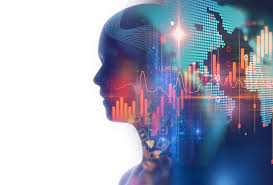
Artificial Intelligence: The Intelligent Revolution
Artificial Intelligence (AI) has moved from the realm of science fiction to becoming an integral part of our daily lives. AI’s ability to analyze vast amounts of data, recognize patterns, and make decisions with minimal human intervention has opened up new possibilities in countless industries.
- Healthcare: AI is revolutionizing healthcare by enabling personalized medicine, improving diagnostic accuracy, and accelerating drug discovery. Machine learning algorithms can analyze medical images faster and more accurately than humans, identifying conditions such as cancer at earlier stages. Additionally, AI-driven tools are being used to develop customized treatment plans tailored to individual patients, increasing the efficacy of treatments.
- Finance: In finance, AI is transforming the way we manage money. Robo-advisors use AI algorithms to provide personalized investment advice, while fraud detection systems leverage machine learning to identify and prevent fraudulent activities in real-time. AI is also automating routine tasks, such as customer service and risk assessment, allowing financial institutions to operate more efficiently.
- Retail: Retailers are using AI to enhance customer experiences through personalized recommendations, inventory management, and demand forecasting. AI-powered chatbots are becoming a common feature on e-commerce websites, providing instant customer support and improving overall user experience.
- Autonomous Vehicles: The automotive industry is undergoing a revolution with the development of AI-driven autonomous vehicles. These self-driving cars rely on AI to interpret data from sensors, cameras, and GPS systems to navigate roads safely. Companies like Tesla and Waymo are at the forefront of this innovation, promising to reduce accidents and change the way we commute.
Blockchain: The Trust Mechanism
Blockchain technology, initially known for powering cryptocurrencies like Bitcoin, has evolved far beyond its original purpose. At its core, Blockchain is a decentralized, distributed ledger that records transactions across many computers in a way that ensures the data cannot be altered retroactively. This inherent transparency and security have made Blockchain a powerful tool across various industries.
- Finance: Beyond cryptocurrencies, Blockchain is making waves in the broader financial sector. Decentralized finance (DeFi) platforms are emerging, offering services such as lending, borrowing, and trading without the need for traditional banks. Blockchain also facilitates faster, more secure cross-border payments, reducing the need for intermediaries and lowering transaction costs.
- Supply Chain Management: Blockchain is transforming supply chain management by providing end-to-end transparency. It allows businesses to track products from the point of origin to the consumer, ensuring authenticity and reducing the risk of fraud. This is particularly valuable in industries such as pharmaceuticals and food, where the integrity of products is crucial.
- Voting Systems: The security and transparency offered by Blockchain make it an ideal solution for modernizing voting systems. Blockchain-based voting platforms ensure that each vote is counted accurately and that the results are immutable, reducing the risk of election fraud and increasing voter confidence in the process.
- Digital Identity: Blockchain is also being used to create secure digital identities. These identities can be used for various purposes, from online authentication to verifying credentials without the need for centralized databases, which are often vulnerable to hacks and data breaches.
The Intersection of AI and Blockchain
While AI and Blockchain are powerful on their own, their convergence is opening up even more possibilities. The combination of AI’s predictive capabilities with Blockchain’s security and transparency is paving the way for innovative applications.
- Smart Contracts: AI can enhance smart contracts—self-executing contracts with the terms of the agreement directly written into code—by making them more intelligent. AI algorithms can monitor contract execution and automatically adjust terms based on real-time data, ensuring that agreements are upheld fairly and efficiently.
- Data Security and Privacy: AI systems often require vast amounts of data to function effectively, raising concerns about data privacy and security. Blockchain can address these concerns by providing a secure, decentralized framework for data storage and access. This combination ensures that sensitive data is used ethically and remains protected from unauthorized access.
- Decentralized AI: Blockchain can enable the development of decentralized AI models, where data is processed at the edge rather than being centralized in a single location. This approach not only enhances privacy but also reduces the risk of data manipulation, making AI more trustworthy.
Conclusion
The rise of AI and Blockchain represents a paradigm shift in how we approach technology. These groundbreaking innovations are not just changing the game—they are rewriting the rules entirely. As they continue to evolve, the integration of AI and Blockchain will unlock new opportunities, drive efficiencies, and provide solutions to some of the most pressing challenges of our time. For businesses and individuals alike, staying ahead of these technologies is crucial to remaining competitive in an increasingly digital world. The future is being shaped today, and those who embrace these changes will be the ones who thrive in the years to come.